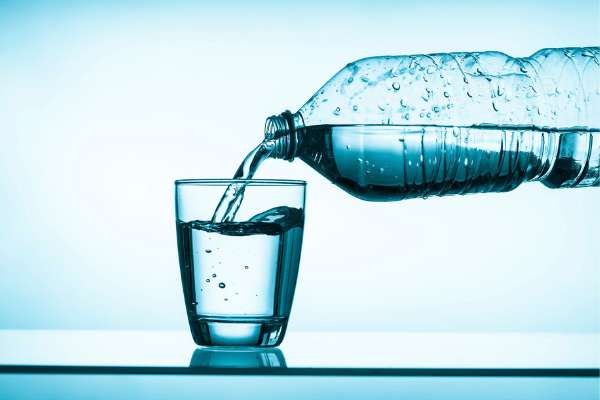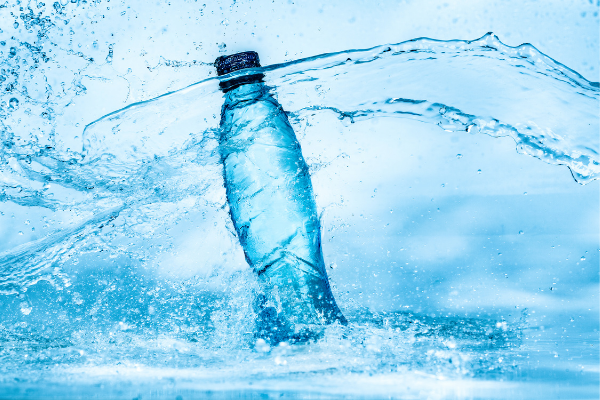Mineral water is extracted from underground reservoirs; it is the water that occurs naturally in nature, pure and unfiltered. It contains dissolved salts and minerals, majorly sodium, magnesium, and calcium, hence the name mineral water; unlike tap water that comes to your homes, mineral water does not necessarily undergo any chemical processing.
Are there any side effects to drinking mineral water? What are its benefits over regular water? If you are asking yourself these, then worry not; we have answers for you! discussed in the article are the advantages and disadvantages of mineral water while also letting you know its side effects, so let’s dive right into it
What are the Constituents of Mineral Water?

Mineral water is called mineral water because it contains dissolved solids, gases, and minerals in it; the following minerals may be found in mineral water in varying degrees-
- calcium
- Potassium
- Sulfate
- Hydrogen carbonate
- sodium
- bicarbonate
- iron
- Zinc
- Magnesium
And gases like
- Carbon dioxide
- Hydrogen sulfate
Now that you know the constituents let’s look at the advantages or disadvantages that these minerals bring-
Advantages of Mineral Water –

Mineral water has been used since ancient times for its therapeutic properties and in keeping various diseases at bay; why? Because of the various advantages-
1. Aids in lowering blood pressure
People with a low amount of magnesium in their body may fall prey to heart issues like hypertension and blood pressure; hence it is required that you take the optimum amount of magnesium required to keep your heart healthy.
Mineral water contains a good amount of magnesium and helps in reducing blood pressure and improving overall heart health.
2. Helps in regulation of blood circulation
Calcium, magnesium, and potassium present in mineral water help regulate the rhythm of your heartbeat and aid in better blood circulation . Helping improve your body’s functioning.
3. Bone strengthening
Calcium is an essential mineral found in mineral water that helps keep your bones healthy by increasing bone density and supporting bone strengthening. Low bone density can cause your bones to become brittle and weak, primarily seen in women above the age of twenty. They can drink mineral water to keep up the supply of calcium in their bodies.
4. Provides benefits to the skin
Mineral water contains minerals like zinc, copper, and magnesium, which help in keeping your skin healthy, zinc is anti-inflammatory and antibacterial; magnesium helps in keeping the skin healthy, and copper helps in the regulation of collagen hence helping you gain healthy, shiny skin.
5. Increases magnesium
Magnesium is an essential mineral required by the body for nerve functioning, regulating blood pressure, and maintaining optimum glucose levels. An average human will require 310–320 mg of magnesium for females 400–420 mg magnesium for males; mineral water can contain upto 150 mg of magnesium per litre of water depending on the source it is obtained from.
6. Promotes better digestive health
Mineral water can be very beneficial to people who suffer from stool-related conditions like constipation and indigestion. Mineral water contains magnesium which helps in water retention in the intestine improving stool consistency. The magnesium and sodium sulfate also help relieve the muscles of the intestine to help improve your bowel movements and improve the functioning of the gallbladder.
Disadvantages of mineral water –

Though filled with advantages, mineral water has some disadvantages; most of these disadvantages are because of the modern bottling methods of mineral water; you could avoid them if you can source pure mineral water directly from a trustable source.
1. Risk of plastic toxicity
Mineral water is usually made available commercially in plastic bottles; plastic bottles may contain chemicals like BPA and bisphenol A which interferes with the functioning of hormones in your body and, in dire cases, affect your reproduction.
Another concern is microplastic contamination caused by the small pieces of plastic; though the risk of this is not high, it is present.
2. Damages teeth enamel
Though mineral water causes less damage than carbonated drinks, regular consumption might pose a threat to your teeth’ health. Mineral water has a slightly lower pH than regular water; this makes it slightly acidic in nature which will corrode the topmost layer of your teeth known as enamel. This might damage your teeth and make them more prone to cavities.
3. Environmental damage
Mineral water is packaged in plastic bottles, which are detrimental to the environment. Plastic is non-biodegradable in nature, and it takes the earth a long time to be able to decompose it; hence it causes pollution. Overflowing landfills filled with plastic bottles are also a growing concern.
4. Risk of microbial infection
As mineral water is bottled at the source without undergoing any treatment, it may have various microbes and organisms that may cause you harm. Also, the carbonic acid present in carbonated water can cause hiccups or bloating.
5. Harmful for people on a low sodium diet
Drinking mineral water is generally safe for most people, but people who are on a low sodium diet should stay cautious. Some brands of minerals water have a large amount of sodium added to them, which can be detrimental to some; check with your doctor if you are unsure.
FAQs
Q. Can you create mineral water artificially?
Yes, mineral water can be created artificially by adding salts and minerals to distilled water or by aerating it with gasses like Co2.
Q. Is drinking mineral water every day okay?
No, you should not drink mineral water every day or substitute it instead of regular water. You should drink mineral water in line with the amount of magnesium and calcium required by your body, as these two are the most prevalent minerals in mineral water. Consult your dietician or doctor before deciding on the amount of mineral water you should consume.
You May Also Like to Read:
Which water purifier is best in India?
How To Make Mineral Water At Home
10 Most Expensive Water Bottle In The World
Differences Between Alkaline Water And Reverse Osmosis
Conclusion
Mineral water is a great way to replenish your body’s minerals requirement and keep it healthy, but you should always drink it only in optimum amounts. After reading this article, you know what mineral water is, what it consists of, and its advantages and disadvantages; this will help you decide if you should include mineral water in your diet.
Let us know in the comments which point you found most helpful.


